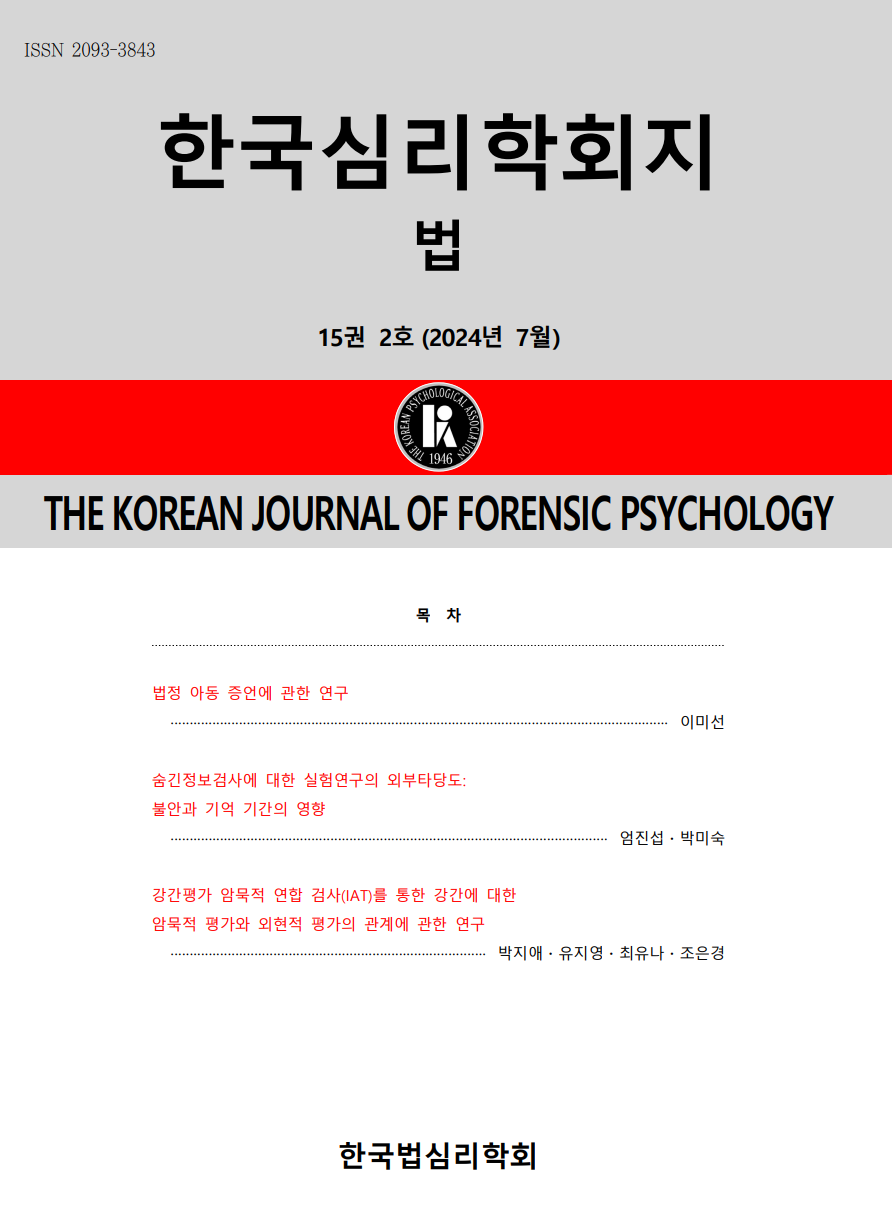 ISSN : 2093-3843
ISSN : 2093-3843
This study examined perceptions of police interrogation techniques and false confession in Korea. General perceptions on police interrogations and their techniques, including how frequently those interrogation techniques are actually used and whether such techniques would elicit false confession, were examined. Furthermore, general perceptions on confession, including the importance of confession evidence in trials and confession possibilities between guilty and innocent were also measured. The results revealed some misconceptions about police interrogation techniques and confession. Also, there was a significant difference on the general perceptions of interrogation techniques by gender. The findings suggest that most lay people believe that police interrogations hardly elicit false confessions from innocent suspects and confessions are reliable evidence. Implications for Korean criminal justice system will be discussed.
권영법 (2012). 현대 심리신문기법과 허위자백. 형사정책연구. 23(3), 91-127
경찰청 (2012). 2012 범죄통계. 서울: 경찰청
경찰청 (2010). 형사사법 선진화를 위한 정책방향:수사구조개혁백서. 서울: 경찰청.
김민지 (2013). 피의자 신문 기법의 문제점 및개선 방안. 한국경찰연구, 12(1), 31-62.
김상준 (2013). 무죄판결과 법관의 사실인정에관한 연구. 박사학위논문, 서울대학교 법학전문대학원.
김웅선 (2008). 피의자신문조서에 관한 연구. 석사학위논문, 성균관대학교 대학원.
김잔디 (2008). 국민참여재판에서 배심원의 권한과 의무. 법교육연구. 3(2), 71-91
김청택 & 최인철 (2010). 법정의사결정에서의판사들의 인지편향. 서울대학교 법학, 51(4), 317-345.
김충식 (2013). 효율적인 신문기법에 관한 실증적 고찰. 한남법학연구, 1, 105-152.
박갑렬 (2005). 피의자신문기법 개선방안 연구. 석사학위논문, 연세대학교 행정대학원.
박경민, 임유석, & 김도우 (2009). 범죄수사절차상 자백의 활용방안. 한국범죄심리연구, 5(2), 31-54.
박미숙 (2010). 국민참여재판의 시행성과와 향후과제. 형사정책연구, 82, 135-174.
박용철 (2006). 기망에 의한 자백의 임의성(Voluntarines)에 대한 비교법적인 고찰. 서강법학연구, 8(-), 61-78.
박용철 (2013). 리드기법의 활용 가능성에 관한 연구. 경찰학논총, 8, 91-116.
박현정 (2013년 8월 27일). 범인 ‘만들어 낸’경찰 조서. 한겨레21. http://www.hani.co.kr/arti/society/society_general/601062.html으로부터 검색
백승경 & 김재휘 (2005). 반복질문이 허위자백에 미치는 영향. 한국심리학회지 사회 및성격, 19(3), 23-36.
이기수 (2012). 형사절차상 허위자백의 원인과대책에 관한 연구. 박사학위논문, 서울대학교 법학전문대학원.
이기수 (2012). 논문: 허위자백의 사례분석을통해 본 형사절차상 문제점. 비교형사법연구, 14(1), 165-192.
이기수 & 김지환 (2012). 피의자신문기법의 문제점과 개선방안에 관한 연구. 한국경찰연구, 11(4), 233-258.
이 윤 (2005). 경찰수사절차상 진술 녹음․녹화제 도입에 관한 연구. 석사학위논문, 연세대학교 대학원.
이 윤 (2009). 수사 절차상 신문과정의 영상녹화 필요성과 영상녹화에 대한 경찰수사관들의 태도. 한림법학 Forum, 20, 11-37.
하태인 (2011). 자백의 증명력 판단에 관한 실질적 기준의 정립. 형사법연구, 23(3), 231-260.
Bond, C. F., & DePaulo, B. M. (2009). Accuracy of deception judgments. Personality and Social Psychology Review, 10(3), 214-234.
Drizin, S. A., & Leo, R. A. (2004). The problem of false confessions in the post-DNA world. North Carolina Law Review, 82, 891-1007.
Findley, K. A., & Scott, M. S. (2006). The multiple dimensions of tunnel vision in criminal cases. Wisconsin Law Review, 2006, 291-397.
Horvath, F., Jayne, B., & Buckley, J. (1994). Differentiation of truthful and deceptive criminal suspects in behavior analysis interviews. Journal of Forensic Sciences, 39(3), 793-807.
Kassin, S. M., Drizin, S. A., Grisso, T., Gudjonsson, G. H., Leo, R. A., & Redlich, A. D. (2010). Police-induced confessions: Risk factors and recommendations. Law and Human Behavior, 34(1), 3-52.
Kassin, S. M., & Gudjonsson, G. H. (2004). The psychology of confessions a review of the literature and issues. Psychological Science in the Public Interest, 5(2), 33-67.
Kassin, S. M., & Sukel, H. (1997). Coerced confessions and the jury: An experimental test of the “harmless error” rule. Law and Human Behavior, 21(1), 27-46.
Kebbell, M. R., & Davies, G. M. (Eds.). (2006). Practical psychology for forensic investigations and prosecutions (Vol. 31). John Wiley & Sons.
Leo, R. A. & Davis, D. (2010). From false confession to wrongful conviction: Seven psychological processes. Journal of Psychiatry &Law, 38(1-2), 9-56.
Leo, R. A., & Liu, B. (2009). What do potential jurors know about police interrogation techniques and false confessions? Behavioral Sciences & the Law, 27(3), 381-399.
Leo, R. A. (2009). False confessions: Causes, consequences, and implications. The Journal of the American Academy of Psychiatry and the Law, 37(3), 332-343.
Leo, R. A., & Ofshe, R. J. (1998). The consequences of false confessions: Deprivations of liberty and miscarriages of justice in the age of psychological interrogation. Journal of Criminal Law & Criminology, 88(2), 429-496.
Meissner, C. A., & Kassin, S. M. (2002). ‘‘He’s guilty!’’: Investigator bias in judgments of truth and deception. Law and Human Behavior, 26, 469-480.
Narchet, F. M., Meissner, C. A., & Russano, M. B. (2011). Modeling the influence of investigator bias on the elicitation of true and false confession. Law and Human Behavior, 35, 452-465.
Rattner, A. (1988). Convicted but innocent:Wrongful conviction and the criminal justice system. Law and Human Behavior, 12(3), 283-293.
Snook, B., Eastwood, J., Stinson, M., Tedeschini, J., & House, J. C. (2010). Reforming investigative interviewing in Canada. Canadian Journal of Criminology and Criminal Justice, 52(2), 215-229.
The Innocence Project (2014, April 10). Retrieved from http://www.innocenceproject.org/